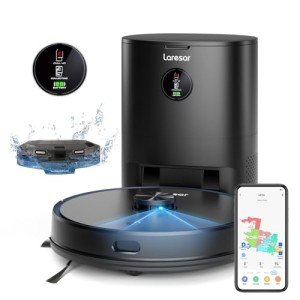10 Things We Hate About Robotic Vacuum
The Rise of the Robotic Vacuum Cleaner: Revolutionizing Home Cleaning
In the world of home appliances, robotic vacuum have actually become one of the most considerable innovations over the last few years. These autonomous gadgets use benefit and efficiency, permitting homeowners to preserve cleaner home without the drudgery of manual vacuuming. This short article explores the advancement, performance, benefits, and factors to consider relating to robotic vacuum cleaners, along with offering insights through data tables and often asked concerns.
A Brief History of Robotic Vacuum Cleaners
The journey of robotic vacuum began in the late 20th century, with early prototypes failing to make considerable strides in homes. However, improvements in technology resulted in the introduction of more refined designs in the early 2000s. Companies such as iRobot and Neato played a critical role in promoting these clever home devices.
Development Timeline of Robotic Vacuum Cleaners
Year
Turning point
1996
Introduce of the first robotic vacuum, the ELECTROLUX TRINITY
2002
iRobot presents the Roomba, an extensively acknowledged model
2012
Introduction of models with advanced mapping abilities
2020
Incorporation of artificial intelligence for boosted navigation
2023
Designs with incorporated wise home connection and app control
How Robotic Vacuum Cleaners Work
Robotic vacuum make use of a combination of sensing units, mapping technology, and expert system to browse and clean various surfaces effectively. Here's a simplified summary of their core functionality:
Sensors: Equipped with infrared or ultrasonic sensors, these gadgets can identify barriers, cliffs, and dirt, enabling them to browse through spaces without crashing into furnishings or tumbling down stairs.
Navigation: Most contemporary robotic vacuum incorporate clever mapping innovations, enabling them to draw up the home design and enhance cleaning paths.
Cleaning Mechanism: Using brushes and suction power, robotic vacuums gather dirt, dust, and debris from different floor types, including carpets and hardwood.
Charging and Cleaning Schedules: After completing a cleaning session or when their battery runs low, these robotics automatically go back to their charging dock. Users can set cleaning schedules through smartphone apps, assisting maintain a neat home effortlessly.
Benefits of Robotic Vacuum Cleaners
Robotic vacuum cleaners offer various benefits over traditional vacuuming techniques. Here are some of the key benefits:
- Time-Saving: Automated cleaning implies homeowners can allocate their time to other activities.
- Convenience: Scheduling cleaning sessions allows for a tidy home without manual intervention.
- Thorough Cleaning: Many robotic models come with specialized brushes to tackle animal hair and provide deep cleaning on carpets and rugs.
- Smart Home Integration: Many systems work with clever home systems, using voice control and remote management.
Popular Features in Robotic Vacuum Cleaners
Function
Description
Mapping Technology
Develops a digital map of the cleaning location
Mobile App Control
Provides users the capability to start/stop or schedule cleaning sessions from another location
Self-Cleaning
Some designs have docking stations that can self-empty dust bins
Advanced Sensors
Detects dirt more efficiently and navigates much better
Voice Control
Compatible with virtual assistants like Alexa and Google Assistant
Factors to consider Before Purchasing a Robotic Vacuum Cleaner
While robotic vacuum cleaners provide many advantages, prospective purchasers ought to consider a couple of elements before buying. Here are some indicate remember:
Key Factors to Evaluate
Floor Type: Certain designs perform much better on carpets while others stand out on hard floors. Purchasers should select versatile vacuums if they have blended floor covering.
Battery Life: Longer battery life permits extended cleaning sessions. Try to find designs that can cover big areas without frequent charging.
Dustbin Capacity: A bigger dustbin minimizes the frequency of clearing, making cleaning less labor-intensive.
Sound Level: Some models run silently, which is perfect for homes with babies or delicate animals.
Upkeep: Users need to likewise examine the ease of maintenance, specifically for filters and brushes.
Possible Drawbacks
- Rate: Robotic vacuum cleaners can be considerably more costly than standard vacuums.
- Effectiveness: While they efficiently maintain cleanliness, they may not always match the deep cleaning effectiveness of manual vacuums.
- Barrier Navigation: Some models might battle with particular types of furnishings or cluttered areas, possibly leading to missed out on areas.
Frequently Asked Questions About Robotic Vacuum Cleaners
Q1: How typically should I run my robotic vacuum cleaner?
A1: It generally depends upon your household. For automatic hoover UK with pets or high foot traffic, running it day-to-day is beneficial. In less active homes, you may find every other day is enough.
Q2: Can robotic vacuum work on carpets?
A2: Most robotic vacuums can clean up carpets; however, features such as suction power and brush style can considerably impact their effectiveness on various carpet types.
Q3: Are robotic vacuum cleaners helpful for family pet hair?
A3: Yes, lots of models are specifically designed to get pet hair and include specialized brushes to avoid tangling.
Q4: What happens when the vacuum lacks battery?
A4: Most robotic vacuums instantly go back to their charging dock when their battery is low, ensuring they are all set for the next cleaning session.
Q5: Can I manage my robotic vacuum with my mobile phone?
A5: Yes, many robotic vacuum cleaners come equipped with mobile apps that permit you to arrange cleanings, screen progress, and receive notifications.
Robotic vacuum represent a considerable advancement in home-cleaning innovation, merging benefit with efficiency to fundamentally alter how families keep tidiness. As innovations continue to emerge, these gadgets are ending up being progressively capable, using users not only time-saving solutions but likewise improved cleaning experiences. As the marketplace continues to grow, possible buyers are encouraged to weigh the functions, benefits, and factors to consider thoroughly to find the best model customized to their unique needs. Whether it's a hectic household, a family pet lover, or someone seeking automation in their cleaning regimen, there's most likely a robotic vacuum that fits the expense.
